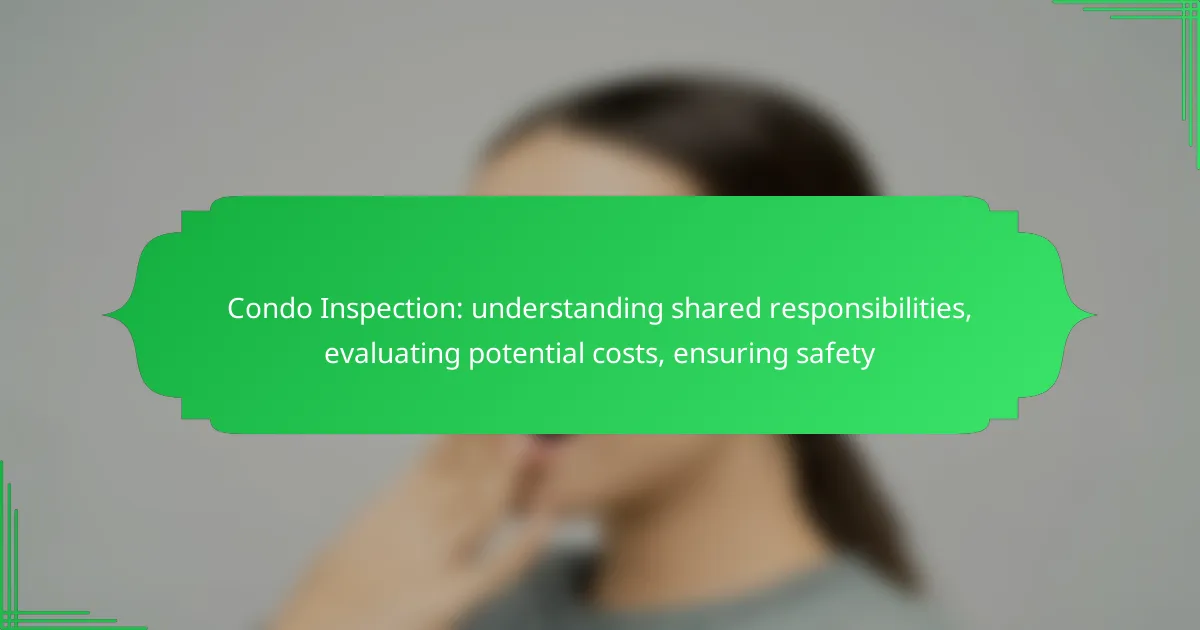Condo inspections are essential for understanding shared responsibilities among owners, associations, and property management, all of which contribute to the safety and upkeep of the property. By evaluating potential costs associated with inspections and repairs, residents can make informed decisions about their investments. Prioritizing safety measures during these inspections ensures a secure living environment for all.
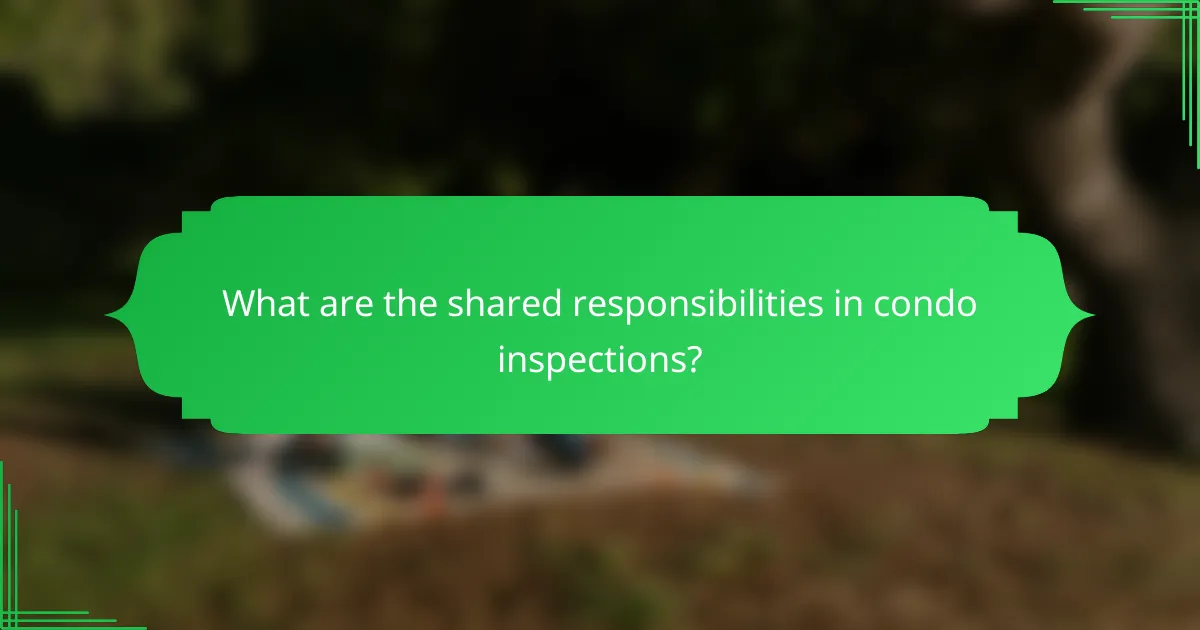
What are the shared responsibilities in condo inspections?
Shared responsibilities in condo inspections involve the obligations of owners, the association, and property management. Each party plays a crucial role in maintaining safety and compliance, ensuring that the property remains in good condition and meets regulatory standards.
Owner obligations
Condo owners are responsible for the upkeep of their individual units, which includes regular maintenance and timely reporting of any issues. This may involve inspections of appliances, plumbing, and electrical systems within their units to prevent larger problems.
Owners should also be aware of any specific regulations set by the condo association regarding inspections. Failing to adhere to these rules can lead to penalties or increased costs for repairs that could have been avoided.
Association duties
The condo association is tasked with overseeing the common areas and ensuring that the building complies with local safety regulations. This includes conducting regular inspections of shared facilities like hallways, elevators, and roofs.
Associations should maintain a schedule for inspections and communicate findings to all owners. They often manage the costs associated with repairs in common areas, which can impact the monthly fees paid by residents.
Property management roles
Property management companies typically handle the day-to-day operations of the condo, including organizing inspections and coordinating maintenance work. They serve as a liaison between the owners and the association, ensuring that all parties are informed and compliant.
Effective property management includes keeping detailed records of inspections and maintenance activities. This documentation is vital for tracking issues over time and can help in budget planning for future repairs or upgrades.
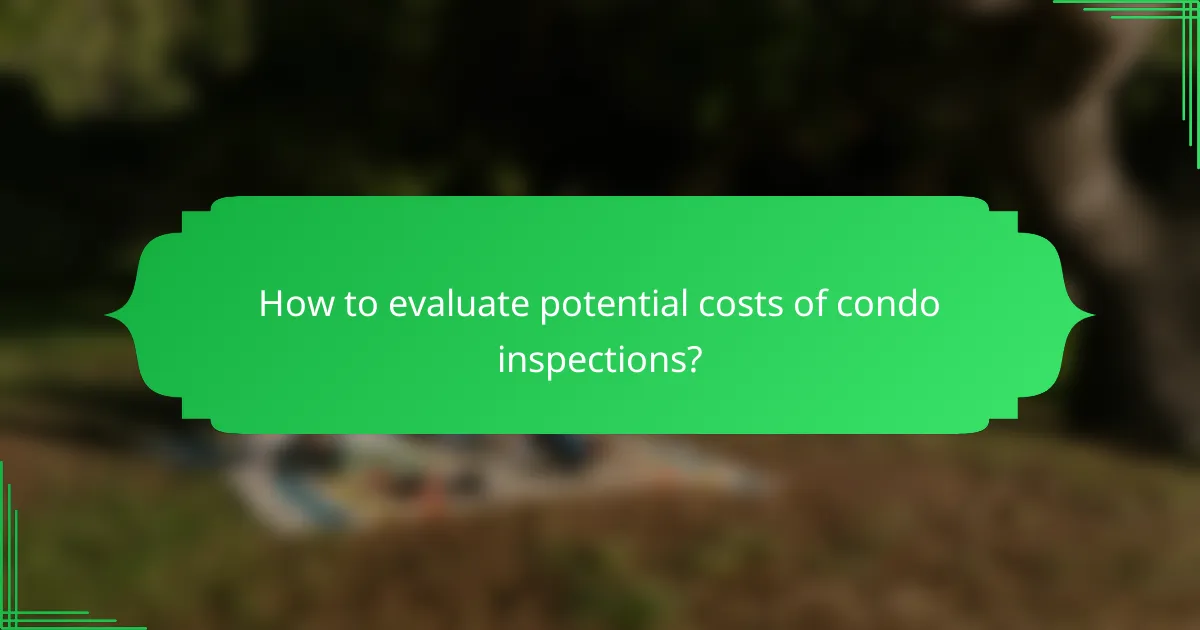
How to evaluate potential costs of condo inspections?
Evaluating potential costs of condo inspections involves understanding various fees associated with the inspection process, estimating repair costs, and considering long-term maintenance expenses. By breaking down these elements, you can make informed decisions about your investment.
Inspection fees
Inspection fees typically range from a few hundred to over a thousand dollars, depending on the size and location of the condo. It’s essential to obtain quotes from multiple inspectors to ensure competitive pricing. Look for inspectors who are certified and have good reviews to ensure quality service.
Some inspectors may charge additional fees for specialized assessments, such as mold or pest inspections. Be sure to clarify what is included in the base fee and any potential extra costs before hiring an inspector.
Repair estimates
Repair estimates can vary significantly based on the condition of the condo and the extent of necessary repairs. It’s advisable to get estimates from licensed contractors for any issues identified during the inspection. This will help you gauge the financial implications of repairs and whether they fit within your budget.
Common repairs in condos may include plumbing issues, electrical upgrades, or structural fixes. Having a clear understanding of these potential costs will help you negotiate with the seller or plan your finances accordingly.
Long-term maintenance costs
Long-term maintenance costs are crucial to consider when evaluating a condo. These can include regular upkeep, such as landscaping, HVAC servicing, and roof repairs, which can add up over time. It’s wise to budget around 1% to 3% of the property value annually for maintenance expenses.
Additionally, consider the condo association fees, which often cover shared maintenance and repairs. Review the association’s financial health and reserve funds to ensure they can handle future repairs without imposing large special assessments on owners.
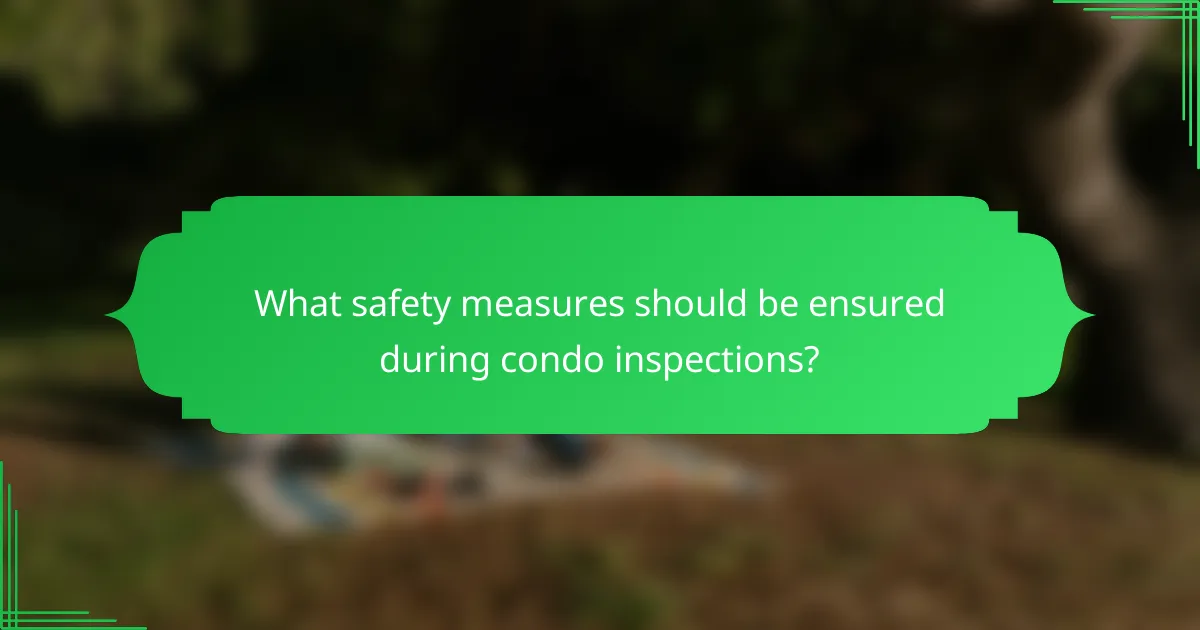
What safety measures should be ensured during condo inspections?
Condo inspections should prioritize safety measures that protect residents and property. Key areas of focus include fire safety compliance, structural integrity checks, and health hazard assessments to ensure a safe living environment.
Fire safety compliance
Fire safety compliance involves verifying that the condo meets local fire codes and regulations. Inspectors should check for functional smoke detectors, fire alarms, and sprinkler systems, as well as clear escape routes. Regular maintenance of these systems is crucial for effective fire prevention.
Additionally, ensure that fire extinguishers are accessible and up to date, typically requiring inspection every year. Familiarize yourself with the fire safety plan of the building, including evacuation procedures and assembly points.
Structural integrity checks
Structural integrity checks assess the overall stability and safety of the building. Inspectors should look for signs of damage such as cracks in walls, uneven floors, or water leaks that could indicate foundational issues. Regular assessments help identify potential problems before they escalate.
It’s advisable to document any findings and address them promptly, as neglecting structural issues can lead to costly repairs. Engaging a licensed structural engineer for thorough evaluations can provide peace of mind and ensure compliance with safety standards.
Health hazard assessments
Health hazard assessments focus on identifying environmental risks within the condo, such as mold, asbestos, or lead paint. Inspectors should conduct air quality tests and check for water damage that could foster mold growth. Addressing these hazards is essential for resident health and safety.
Consider hiring certified professionals for comprehensive assessments, especially in older buildings where these issues are more prevalent. Regular monitoring and maintenance can help mitigate health risks and ensure a safe living environment for all residents.
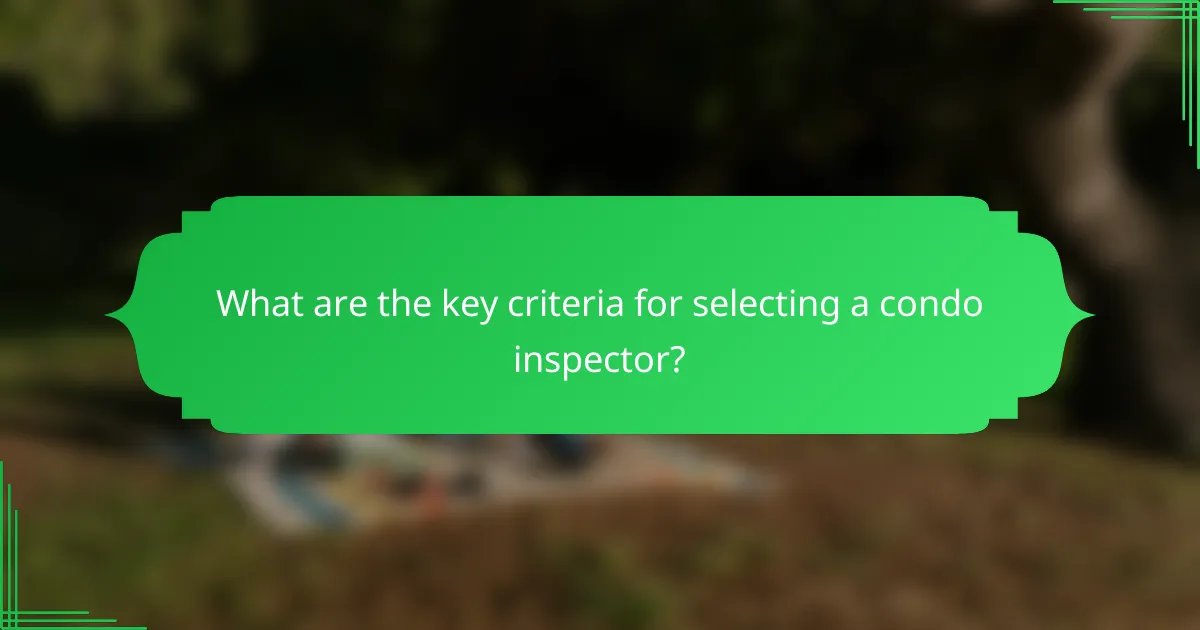
What are the key criteria for selecting a condo inspector?
When selecting a condo inspector, focus on their qualifications, experience with condominiums, and client feedback. These criteria ensure that the inspector is knowledgeable about the specific issues that can arise in shared living environments.
Qualifications and certifications
Look for inspectors who hold relevant certifications, such as those from the International Association of Certified Home Inspectors (InterNACHI) or the American Society of Home Inspectors (ASHI). These certifications indicate that the inspector has undergone training and adheres to industry standards.
Additionally, verify if they have any specialized training related to condo inspections, as this can provide insights into common structural and safety concerns unique to multi-unit buildings.
Experience with condos
Experience is crucial when selecting a condo inspector. Inspectors with a background in condo assessments are more likely to identify issues specific to shared properties, such as common area maintenance and structural integrity of adjoining units.
Ask potential inspectors how many condo inspections they have performed and request examples of typical issues they have encountered. This will help gauge their familiarity with the complexities of condo living.
Client reviews and references
Client reviews can provide valuable insights into an inspector’s reliability and thoroughness. Look for testimonials on their website or third-party review platforms to assess their reputation.
Request references from past clients and follow up to ask about their experiences. Inquire about the inspector’s communication style, thoroughness of the inspection, and any follow-up support provided after the inspection was completed.
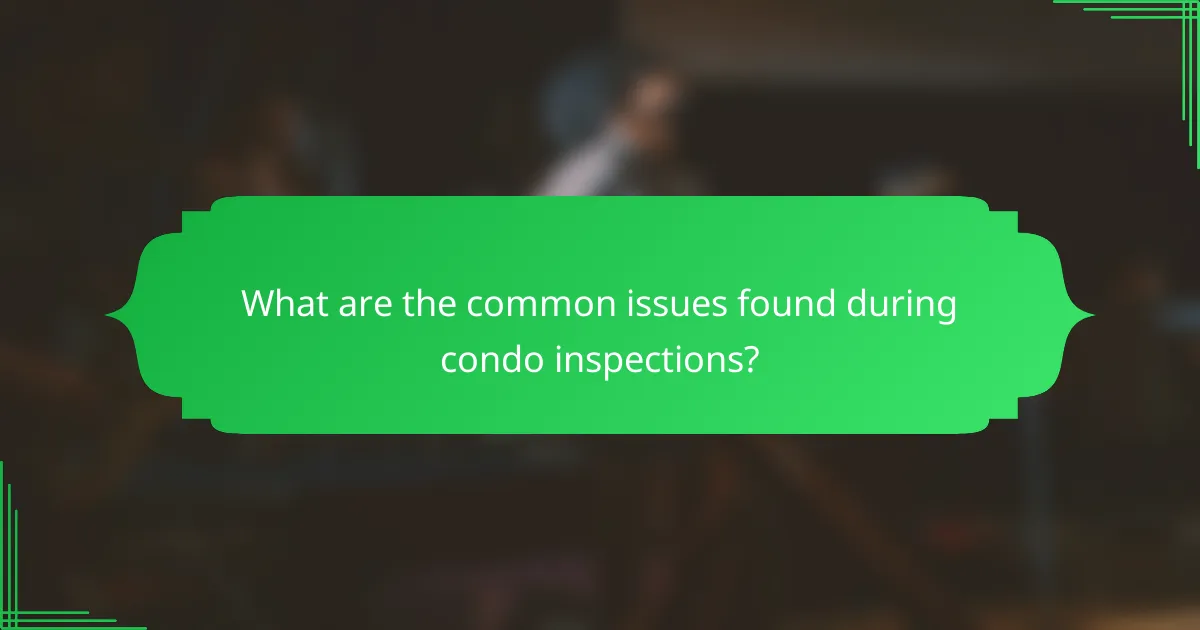
What are the common issues found during condo inspections?
Common issues found during condo inspections often include water damage, pest infestations, and electrical system problems. Identifying these issues early can save homeowners from costly repairs and ensure safety in shared living environments.
Water damage
Water damage is a frequent concern in condos, often resulting from leaks in plumbing, roofs, or windows. Signs may include stains on walls or ceilings, mold growth, and musty odors. Addressing water damage promptly is crucial to prevent structural issues and health risks.
When inspecting for water damage, check areas around appliances, bathrooms, and balconies. If you find evidence of leaks, it’s advisable to consult a professional to assess the extent of the damage and necessary repairs, which can range from minor fixes to major renovations.
Pest infestations
Pest infestations can significantly affect the quality of life in a condo. Common pests include rodents, cockroaches, and termites, which can cause damage to property and pose health risks. Regular inspections can help identify pest issues before they escalate.
Look for signs such as droppings, nests, or damage to wood and insulation. If pests are detected, consider contacting a pest control service to evaluate the situation and recommend treatment options. Preventive measures, such as sealing entry points and maintaining cleanliness, can help mitigate infestations.
Electrical system problems
Electrical system problems are critical issues that can pose safety hazards in condos. Common concerns include outdated wiring, overloaded circuits, and malfunctioning outlets. These problems can lead to power outages or even fire risks if not addressed.
During an inspection, check for flickering lights, tripped breakers, and signs of overheating around outlets. If any issues are found, hiring a licensed electrician is essential to ensure compliance with local codes and standards. Regular maintenance can help prevent electrical problems and ensure the safety of all residents.
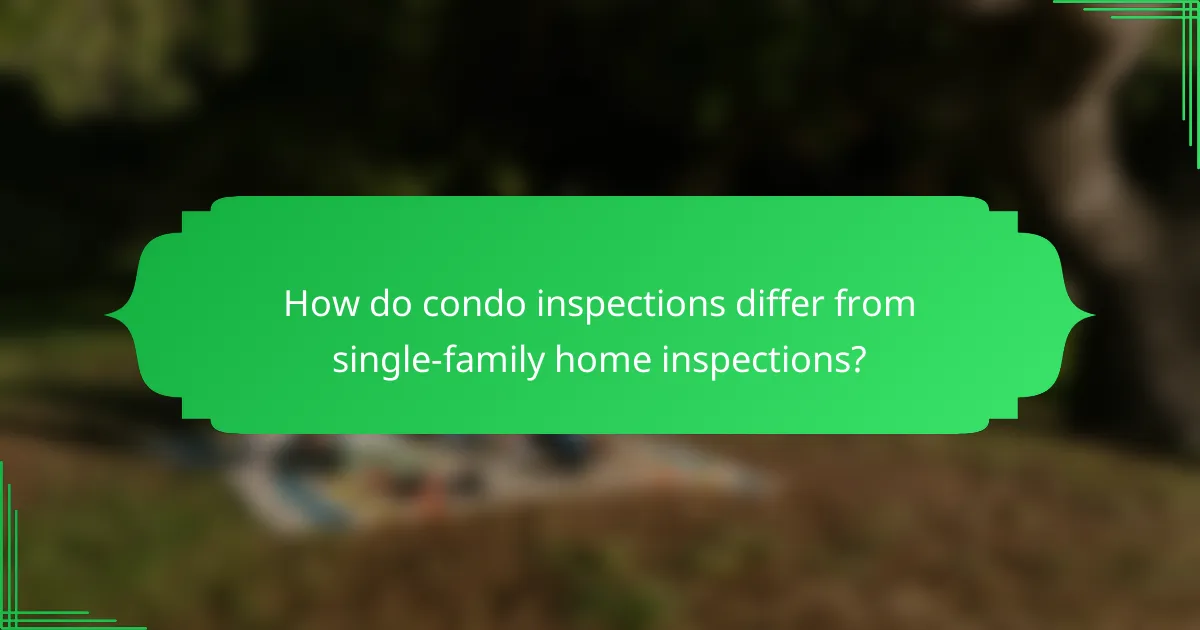
How do condo inspections differ from single-family home inspections?
Condo inspections differ from single-family home inspections primarily due to shared responsibilities and common areas. In a condo, the inspection must consider not only the individual unit but also the building’s shared systems and amenities.
Understanding shared responsibilities
In a condominium, homeowners share ownership of common areas such as hallways, roofs, and recreational facilities. This shared ownership means that any issues in these areas can affect all residents, making it crucial to evaluate them during an inspection. Homeowners should be aware of the condo association’s responsibilities versus their own, as this will influence maintenance and repair obligations.
For example, if the roof needs repair, the condo association typically handles the cost, but individual owners may be responsible for issues within their units. Understanding these distinctions helps homeowners prepare for potential costs and responsibilities.
Evaluating potential costs
When inspecting a condo, it’s essential to assess both immediate and future costs associated with maintenance and repairs. Common expenses can include roof repairs, plumbing issues, or HVAC system replacements, which may be shared among residents. Homeowners should inquire about the condo association’s reserve fund, which is used for major repairs and improvements.
Potential costs can vary widely, but homeowners might expect to contribute to assessments ranging from a few hundred to several thousand dollars, depending on the severity of the issues found. It’s advisable to review past assessments and maintenance records to gauge future financial responsibilities.
Ensuring safety
Safety is a critical aspect of condo inspections, particularly regarding shared systems like fire alarms, elevators, and security features. Inspectors should evaluate these systems to ensure they meet local safety codes and regulations. Homeowners should also check for any history of safety violations within the building.
Additionally, it’s wise to consider the overall safety of the neighborhood and building. Factors like security measures, lighting, and emergency exits can significantly impact residents’ well-being. A thorough inspection will help identify any safety concerns that need addressing before moving in.
